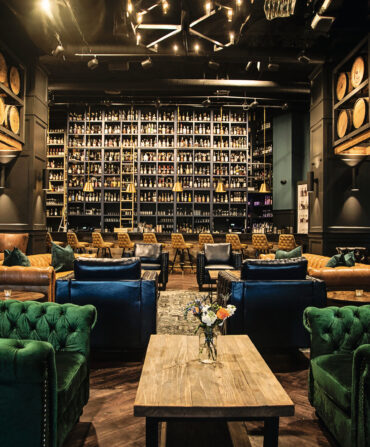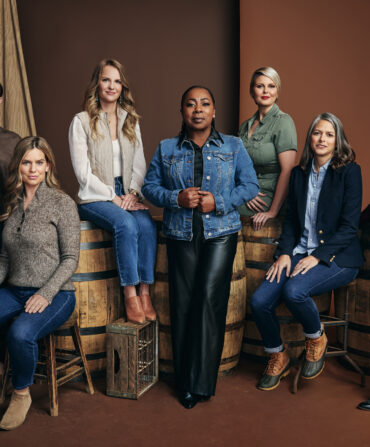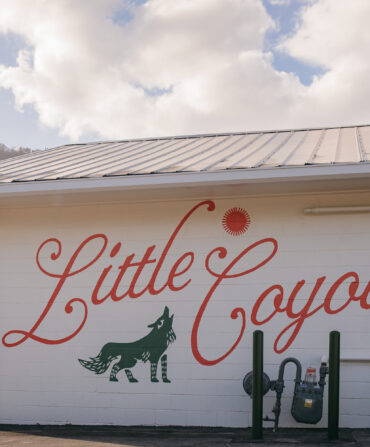Food & Drink
Viva Eddie!
Drummer, firefighter, mayor, chef—Eddie Hernandez has lived more lives than most. But the best way to understand the Atlantan’s past is by way of his South-meets-Mexico food
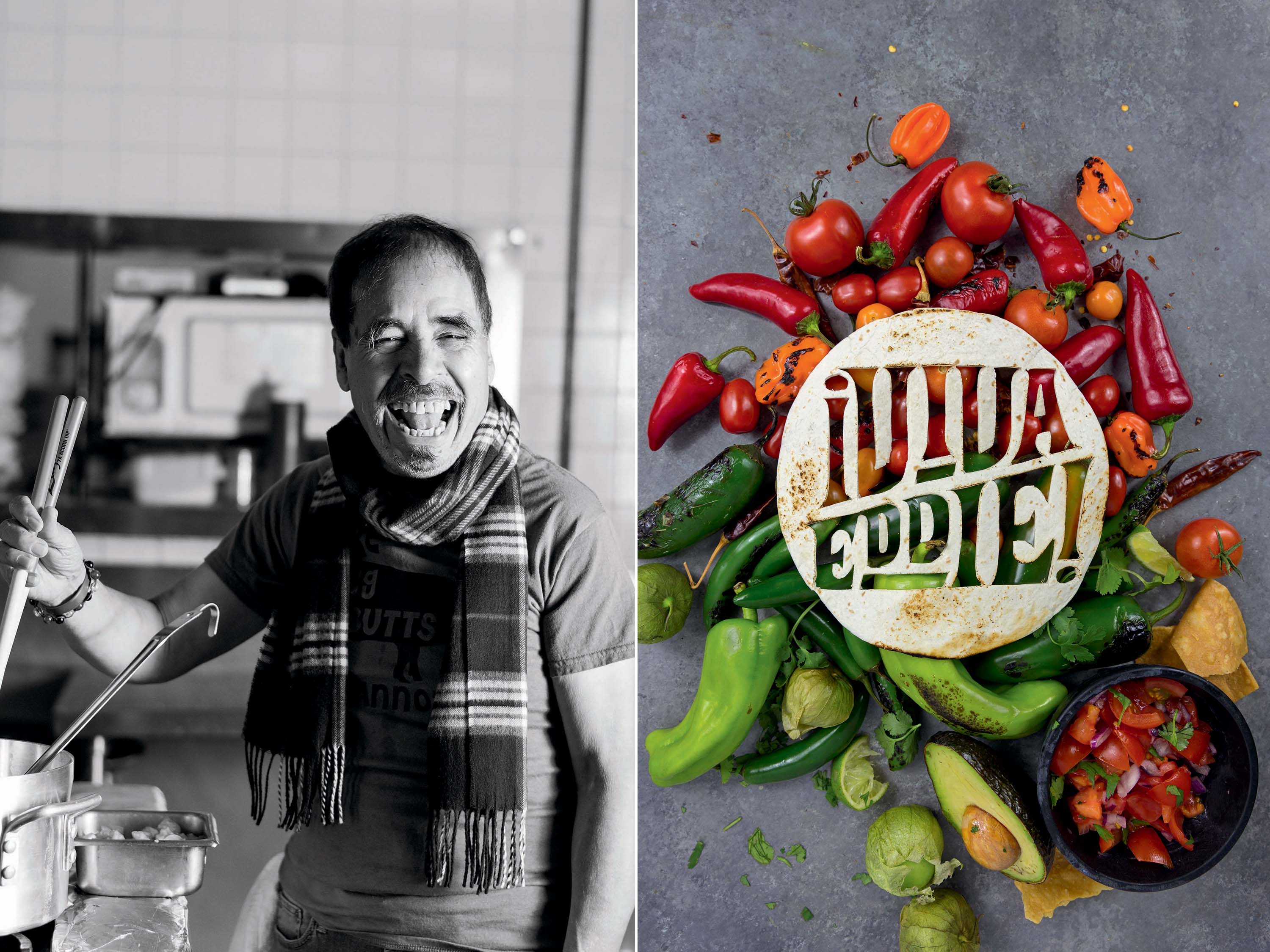
Photo: Bobby Fisher | Photo Illustrations by Danielle Evans
Chef (and former rock drummer) Eddie Hernandez riffs in the kitchen of a Taqueria del Sol in Atlanta.
Eddie Hernandez doesn’t get weepy when he talks about his mother and grandmother. Nor does the chef wax sentimental about their cooking.
“My mom was a typical Mexican country girl who cooked with wood and beat the shit out of you when you didn’t listen,” Hernandez says as he perches on a stool at the Cheshire Bridge Road location of Taqueria del Sol, the beloved regional taco chain he cofounded in Atlanta in 2000. His maternal grandmother was a much-feared businesswoman who ran seven bars, restaurants, and convenience stores around Hernandez’s hometown of Monterrey, Mexico. His father, a railroad engineer, died when Hernandez was nine, leaving the women in the family to take care of him. But instead of spoiling him, they toughened him up.
Hernandez recalls his abuela’s refusing to make her grandson his favorite snack, pickled pigskin—he needed to do it himself, she said. She wouldn’t be around forever. Hernandez may have smarted off to her—“We sort of hit it off because I talked back; nobody else would talk back to her”—but he took her words to heart. By fifteen, he had bought a car and opened a torta stand on the street, stewing carnitas in a big pot. He had not only learned to cook for himself, he was feeding others—and making money from it.
It’s about 9:30 a.m. on a Friday, and Hernandez—now a sixty-three-year-old fireplug with a salt-and-pepper mustache, a matching soul patch, sleepy eyes, and a scattering of maverick runaway eyebrow hairs—sips Mexican hot chocolate and nibbles at pastries before starting the day. Breakfast is his favorite meal: a moment to reflect before the doors open and the patrons queue up for the fried-fish tacos and spicy turnip greens for which he is celebrated.
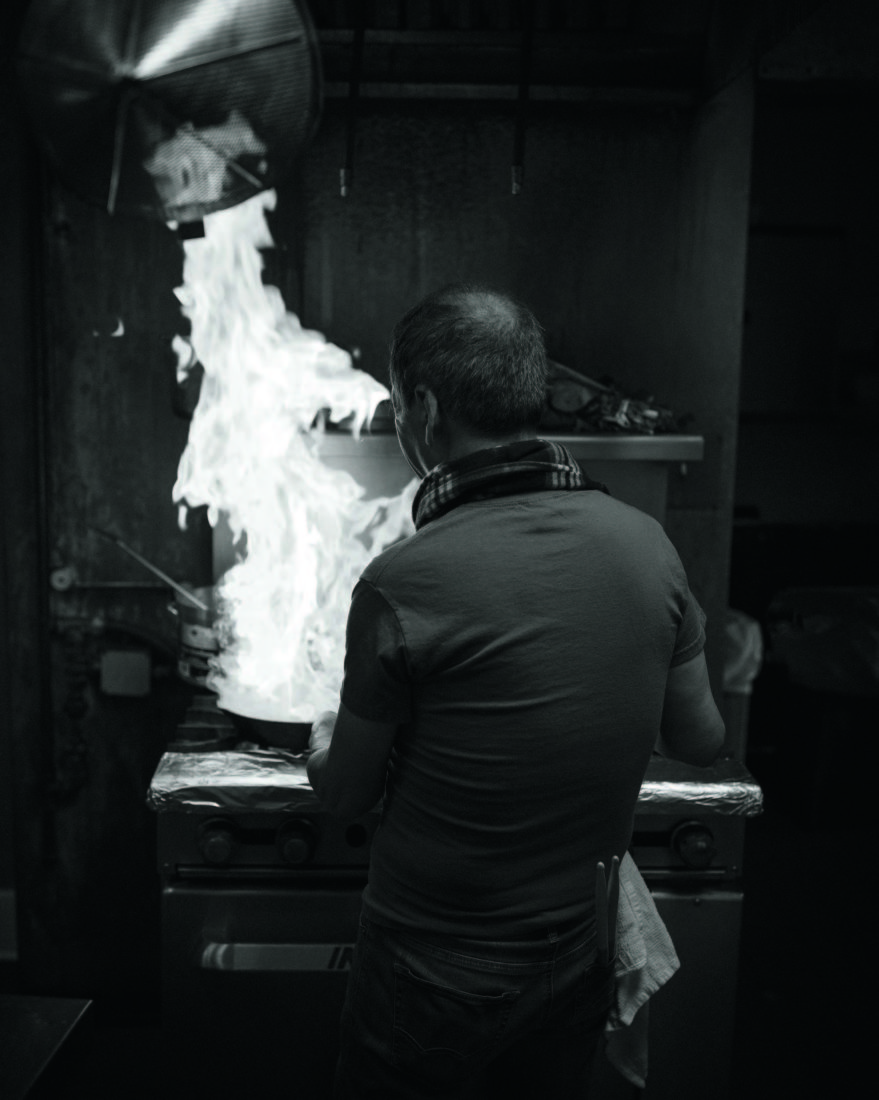
Photo: Bobby Fisher
Hernandez at work.
Eighteen years ago, when he and his business partner, Mike Klank, debuted their first Taqueria del Sol, Mexican food in Atlanta mostly meant mediocre Tex-Mex, making Hernandez’s Southern-tinged take on his homeland’s cuisine a revelation. In April, the chef releases his first cookbook, Turnip Greens & Tortillas: A Mexican Chef Spices Up the Southern Kitchen. Flipping through the pages, one gets a sense of why Hernandez’s particular fusion of Southern, Southwestern, and Mexican traditions has made him one of the most beloved chefs in Atlanta—the recipes tell his life story. The tamales he remembers rolling with his family in Monterrey at Christmastime; the Waco chili he learned to make while competing in Texas cook-off contests; the poblano corn chowder with shrimp he bastardized from a lobster bisque served in a fine Atlanta restaurant where he honed his classic techniques; the chopped pork and coleslaw tacos, and the Hatch chiles rellenos, both a nod to his relationship with the Memphis native (and New Mexico buff) Klank; the shrimp and grits with jalapeños “my way,” as he names the recipe.
Those two words, in fact, are the essence of this highly original, unapologetic, and self-proclaimed “born-again redneck Southern Mexican” chef. For all his mash-up of cultures, Hernandez’s food inspires fans to wait in long lines that snake out of his restaurants and into their parking lots because of one common ingredient:
Eddie himself.
After breakfast, Hernandez drives up to the Atlanta suburb of Chamblee to check on the newest Taqueria. His car is a gray 2007 BMW M5: the prized toy of a man who once equated status with material belongings.
“We all go through phases in life,” he says. “Sometimes it’s the jewelry. Sometimes it’s the clothes. The cologne. The house. The cars. Whatever. Then you get to a point where you think, ‘I don’t give a shit what people think about me.’”
The footloose Hernandez cycled through more phases than most. In 1971, at age seventeen, he left Monterrey for Houston to play drums for Fascinacion, a hard-rock band that performed Cream and Black Sabbath covers. He and his buddies didn’t speak English, so they would “mimic sing,” parroting the lyrics they didn’t understand. Hernandez became the band’s designated cook, whipping up the handmade tortillas and hearty soups he craved from home. He also became smitten with Southern food—Kentucky Fried Chicken in particular, a brand he knew from Mexico and still loves. He likes to trot out the story of a Houston KFC where “nobody spoke any Spanish,” Hernandez says. “So I went up to the counter and said, ‘Grande chicken and grande Coke.’ She gave me a sixteen-piece bucket and a two-liter Coke. I was very happy. They’d see me coming: ‘Grande chicken and grande Coke!’”
Hernandez gained a culinary education (and a little English) by watching Julia Child, Jacques Pepin, and Rick Bayless on television, and when he wasn’t drumming, he picked up shifts at a Houston Tex-Mex chain. As a dishwasher, he soaked up the recipes like a sponge, watching and listening to the cooks as they fixed tortillas and salsas by hand. By and by, he was promoted to line cook and then manager, a job that required him to wear a suit and tie, which he despised. (Even today, he’d much rather don a T-shirt stamped with an image of a toilet and the words “Party Pooper” than a chef’s coat.)
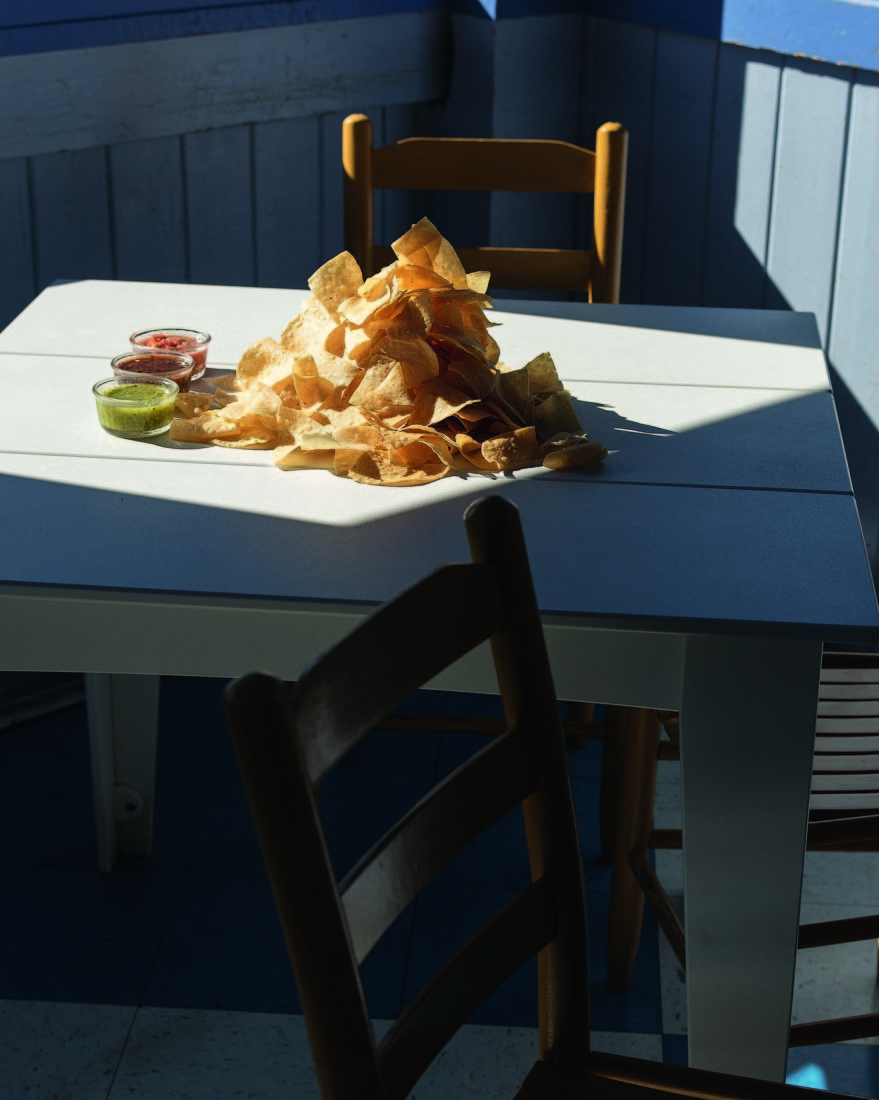
Photo: Bobby Fisher
Taqueria del Sol’s salsa trio, with tortilla chips.
By 1987 he was burned out by the rock-and-roll life and looking to start over. “We got paid really, really well,” Hernandez explains. “The downside was that we slept in shitty motels, ate tons of bad food, and drank like crazy.” His first marriage, to an American woman he “loved to death” but found he couldn’t live with, had ended in divorce. He had started a long-term relationship with another woman and had two children with her, yet felt he needed a clean break. He was chubby, with shaggy hair, a pierced ear, and lots of clunky jewelry. He didn’t like the person he’d become. “I realized I had a problem with drinking,” he says. “I wanted to get my life right.”
At the invitation of a friend, Hernandez moved to Atlanta with $2,000 he intended to blow on a series of binges; if he was going to quit drinking, he was going to have a kick-ass finale. But just a few days into the spree, he stumbled into a Tex-Mex chain restaurant, El Azteca, just south of the city. His friend, partly to taunt him and partly to get him out of the house, bet him he couldn’t get a job there. But he did, and it became one of the defining moments of his life.
El Azteca’s managing partner was Mike Klank, a Tennessean with an engineering degree from Georgia Tech, an MBA from Georgia State, and a serious work ethic. After a few shifts, Hernandez had some news for his boss. “See all the people that came today?” he recalls asking Klank. “He said, ‘Yeah.’ I said, ‘They are not coming back.’ He said, ‘Why?’ I said, ‘The food is really bad. The service is worse. It’s a recipe to go broke.’ He said, ‘What do you suggest?’ I said, ‘Well, I can cook.’”
So Klank put him in charge. Before long, the unlikely pair cut ties with El Azteca, renamed the place Azteca Grill, and let Hernandez’s creativity run free. The chef began to refine his trademark style, dreaming up dishes that combined traditional Mexican food he knew from home, the Tex-Mex he encountered in Houston, and Southwestern touches such as green-chile stew that Klank had fallen for during ski trips to New Mexico.
One day, a customer brought in a garbage bag full of turnip greens. Hernandez asked his boss what the hell he was supposed to do with them. Klank told him Southerners boil the greens with ham hocks and sop up the potlikker with cornbread. The chef had no pork, so he used chicken stock, tomatoes, garlic, and chile de árbol. He refused to make cornbread but served the turnip greens with tortillas. Reviewers praised Hernandez’s spin on the Southern classic, and business boomed.
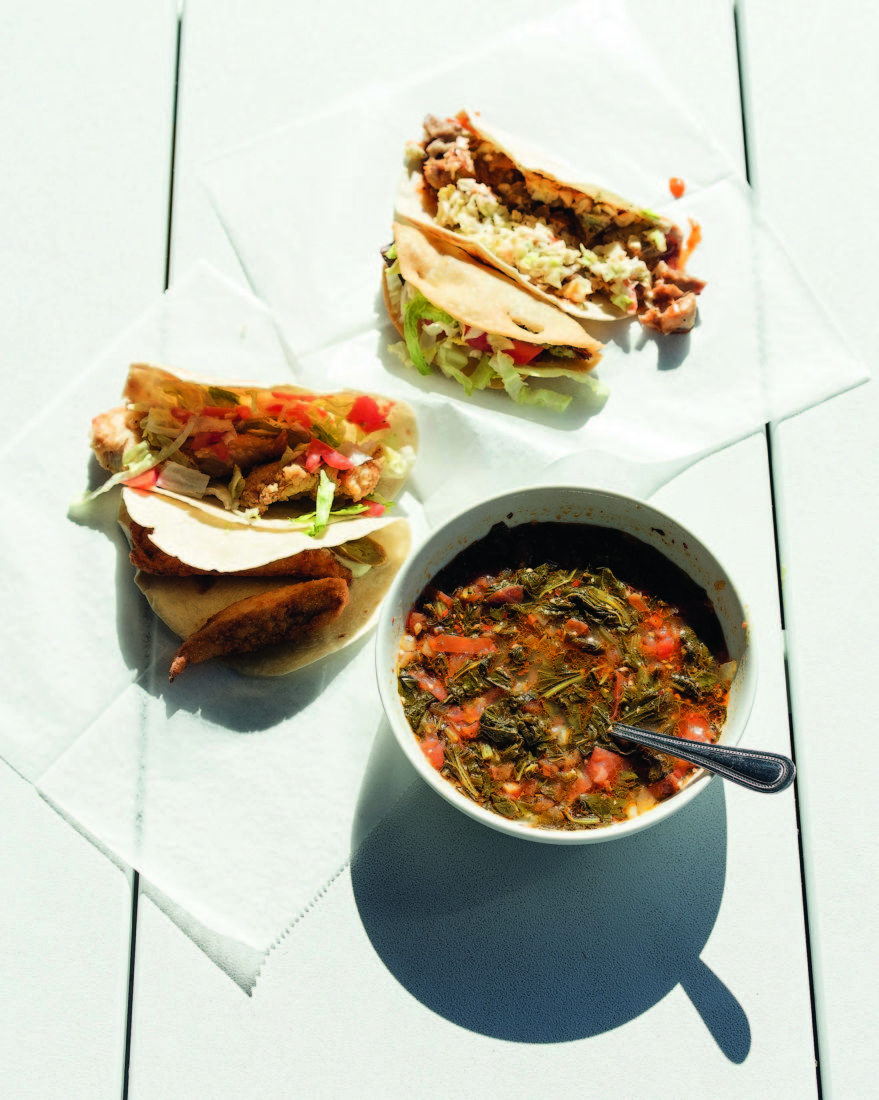
Photo: Bobby Fisher
Hernandez’s Memphis, fried chicken, and fish tacos, with a side of turnip greens.
“At the time, when mainstream Mexican restaurants were like, bleh!—totally awful—this was a great place that had beautiful salsas, stuff that piqued your interest,” recalls Christiane Lauterbach, the persnickety Parisian food critic who has chronicled the Atlanta dining scene for more than three decades. “It was like a bright new thing that was happening in an unlikely location.”
The duo decided to expand in town, opening Sundown Cafe on Atlanta’s Cheshire Bridge Road in 1991, a move that allowed Hernandez to break out of the confines of Tex-Mex and truly come into his own. In his cookbook, he recalls learning to make Cajun classics such as gumbo and étouffée from another chef at Sundown, a Louisianan named Steve Murrell. “Once I mastered each dish,” Hernandez recounts, “Steve would say to me, ‘Okay, Eddie, now destroy it!’ And then I would come up with my way of making it.” That breaking of norms extended to his Mexican take on other Southern dishes at Sundown: Old-fashioned buttermilk fried chicken with green chile–horseradish sauce. Pork with roasted jalapeño gravy and ancho mashed potatoes. Meat loaf with tomato-habanero gravy. The two cuisines, he realized, were not so dissimilar—both emphasized fresh produce, smoked meats, comfort. “All of a sudden, we end up with this type of cuisine that was nonexistent,” Hernandez says.
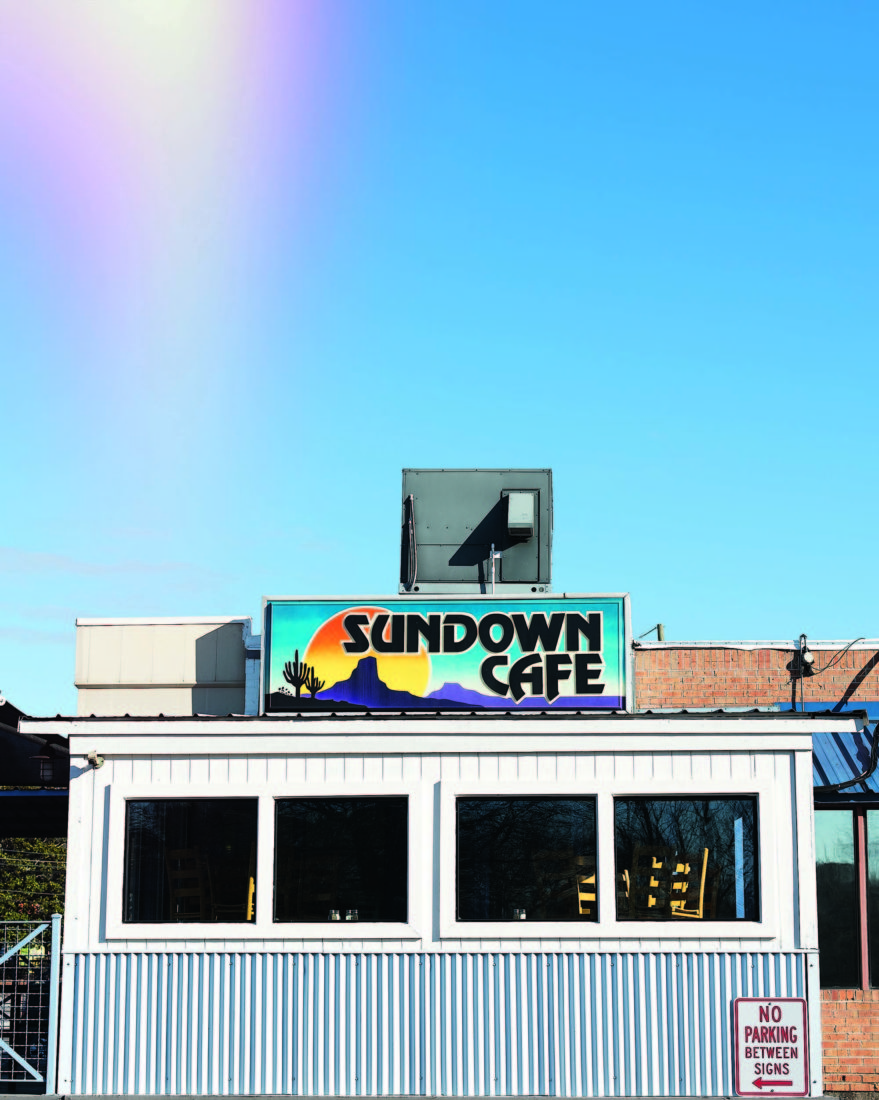
Photo: Bobby Fisher
The old Sundown Cafe sign remains at the Cheshire Bridge location of Taqueria del Sol in Atlanta.
In the mid-1990s, Hernandez returned to Texas, where the mother of his two children, whom he had by then married in Atlanta, had settled with the kids—this time he intended to keep the family together. Though still partners with Klank, he opened a couple of restaurants and worked as a volunteer firefighter in the tiny town of Rosebud, just south of Waco. Almost as a joke, friends suggested he’d make a great mayor after Hernandez said that “any idiot” could do a better job, and to his astonishment, he got elected to the position as a write-in candidate. When people asked what he planned to do, he told them in typical fashion: “I don’t have a f**king clue! I promise you one thing: It will not be boring with me as a mayor. I will be the best mayor you ever seen in your life.” He served a single two-year term and donated his salary to the fire department. “I think it’s a civic duty,” he says of his time in office. “I think everybody should do it, given the chance—as long as you do it for the right reasons.”
But trying to balance two lives in two states left him stressed and overwhelmed, and his second marriage wasn’t working. After coming down with Bell’s palsy, a condition that paralyzed one side of his face and slurred his speech, Hernandez decided to move back to Atlanta for good.
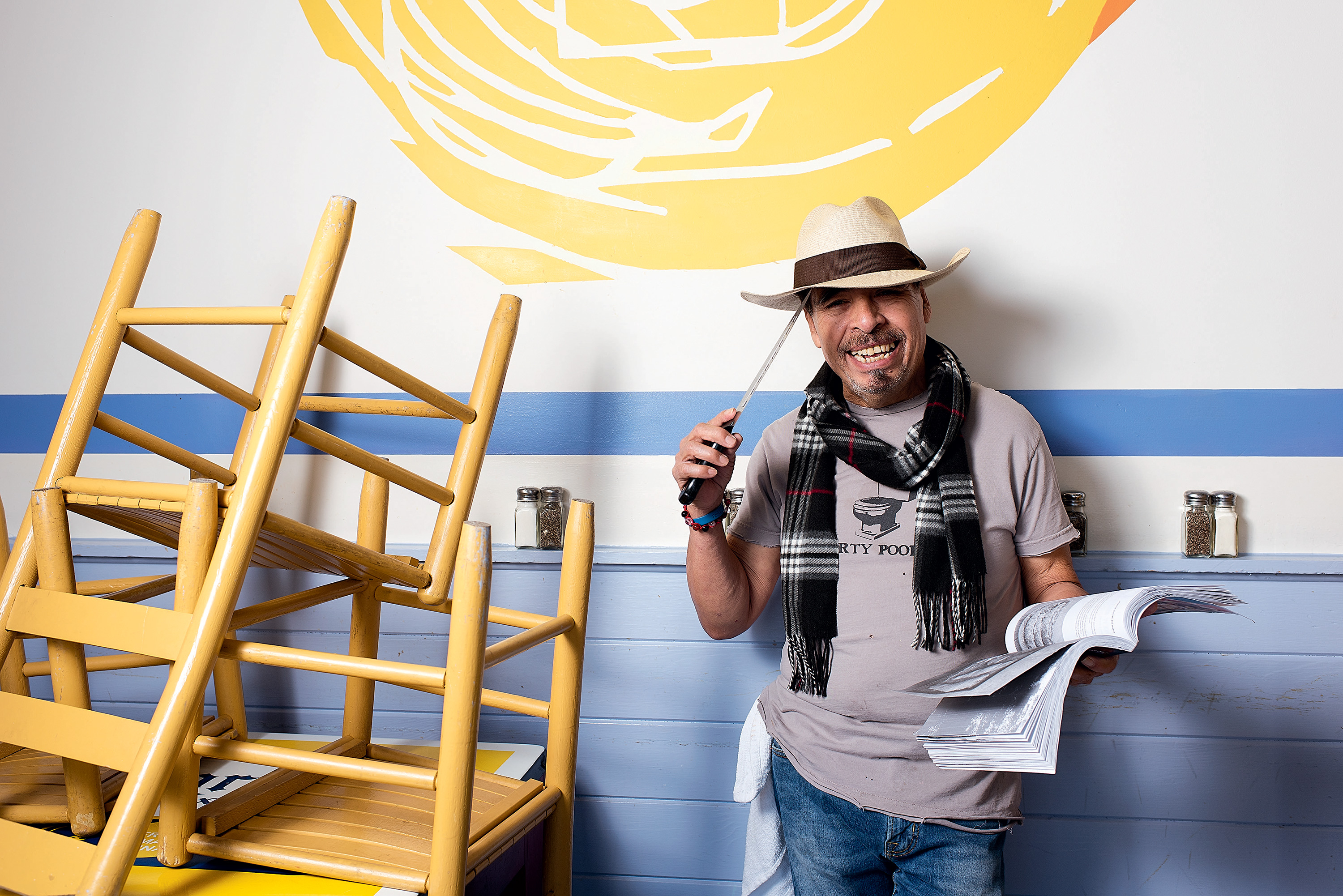
Photo: Bobby Fisher
Hernandez at Taqueria Del Sol.
With Hernandez back in the saddle, he and Klank embarked on a new venture on the then-industrial Westside in 2000. For years, at the request of Sundown customers, the two had served cheap tacos at lunch with great success. So they spun off the concept into the first Taqueria del Sol, which would feature fast-casual Mexican street food reimagined with a Southern kick: soft tacos dripping with tangy Memphis-style pulled pork and creamy slaw, for instance; or stuffed with fried tilapia, poblano tartar sauce, and pickled jalapeños; or filled with beef brisket and pico de gallo.
“They didn’t even know what a fish taco was at the time,” Hernandez says of their early clientele. But soon, throngs of people began lining up outside Taqueria del Sol as if the Virgin of Guadalupe were on view inside.
“It felt like a revolution in terms of how inexpensive it could be, and how well executed,” Lauterbach says. Even Martha Stewart asked for the buttermilk fried chicken recipe during a visit. Eventually Hernandez and Klank converted Sundown into a Taqueria del Sol, too, and expanded their empire into other cities and states. They even caught the eye of the James Beard Foundation, which has named them to the long list for the Outstanding Restaurateur category five times. National recognition for a place dishing up cheeseburger and sloppy-joe tacos? Klank was stunned: “It was like ‘Are we on Candid Camera?’”
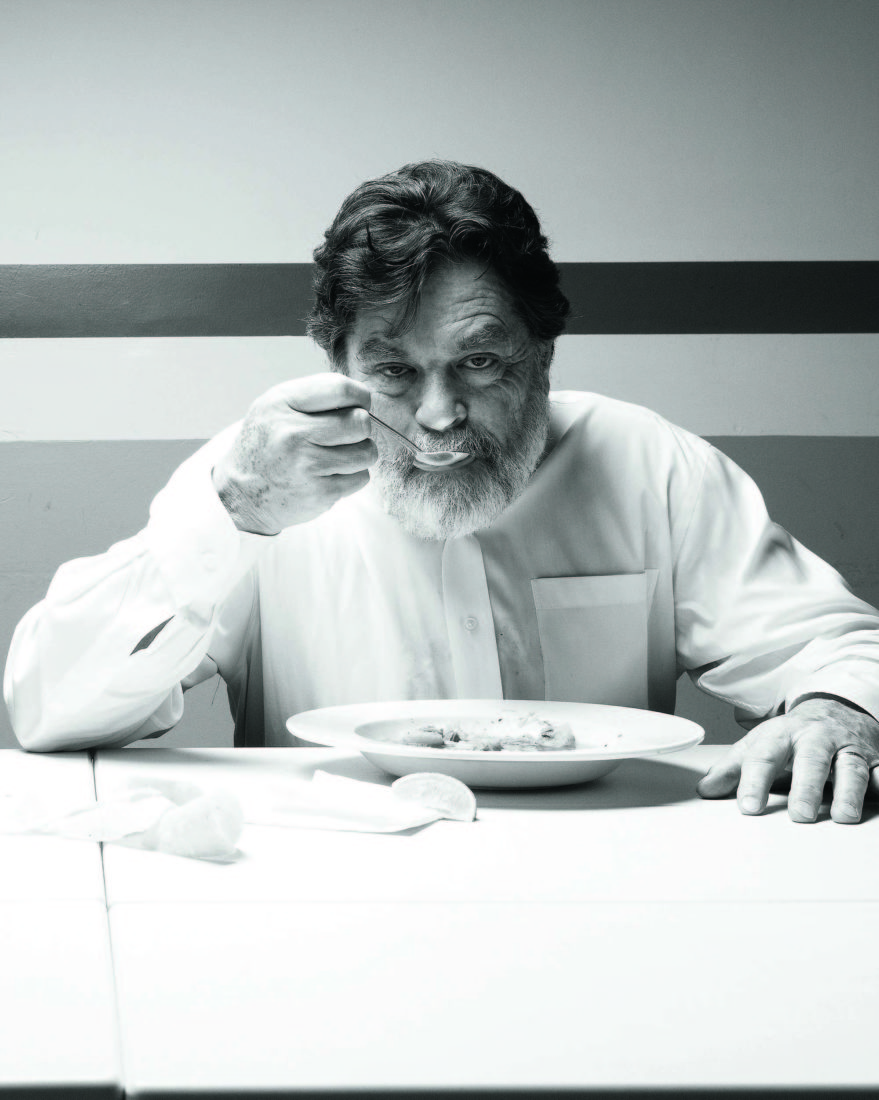
Photo: Bobby Fisher
Hernandez’s business partner, Mike Klank.
While they’ve never made it beyond the Beard semifinals, one doesn’t get the impression Hernandez is bothered. “He’s got an ego,” Klank says. “But unlike some chefs, he’s not ego driven.” He revels in shortcuts other chefs might avoid, using everyday ingredients such as store-bought Aunt Jemima grits, Fritos, canned corn, and iceberg lettuce in his recipes. “Instead of farm to table, Eddie likes to joke that his food is Publix to plate,” says Susan Puckett, a former food editor at the Atlanta Journal-Constitution and the coauthor of his cookbook. In fact, when an editor in New York read their manuscript, she changed every mention of black pepper to specify “freshly ground.” Puckett had to call her up to set her straight: “I hate to tell you, but Eddie doesn’t even own a pepper grinder.”
Back in the Cheshire Bridge Road kitchen, Hernandez is making chicken–green chile potpie in puffy tortilla shells—a recipe Klank loves. Tinny Mexican music blares from the speakers as the restaurant cooks finish frying chips for the salsa. Klank bides his time in the front of the house, waiting to sup on the potpie.
These days, the partners argue like an old married couple. “I’m an engineer,” says Klank, who is now sixty-eight, of their differences. “If anything, that’s what Eddie and I fight most about. I go, ‘Eddie, you’ve got to be consistent! You can’t come in the kitchen and do that.’”
“I remember one day I ordered some brussels sprouts from El Salvador,” Hernandez says. “Mike hates brussels sprouts. And we got into it. He was like, ‘I don’t know why you want to do this!’” He lowers his voice. “And I said, ‘Mike, with all due respect, there’s only so many f**king things I can do with potatoes. You got to let me get my kicks out of something every now and then. We are doing brussels sprouts.’”
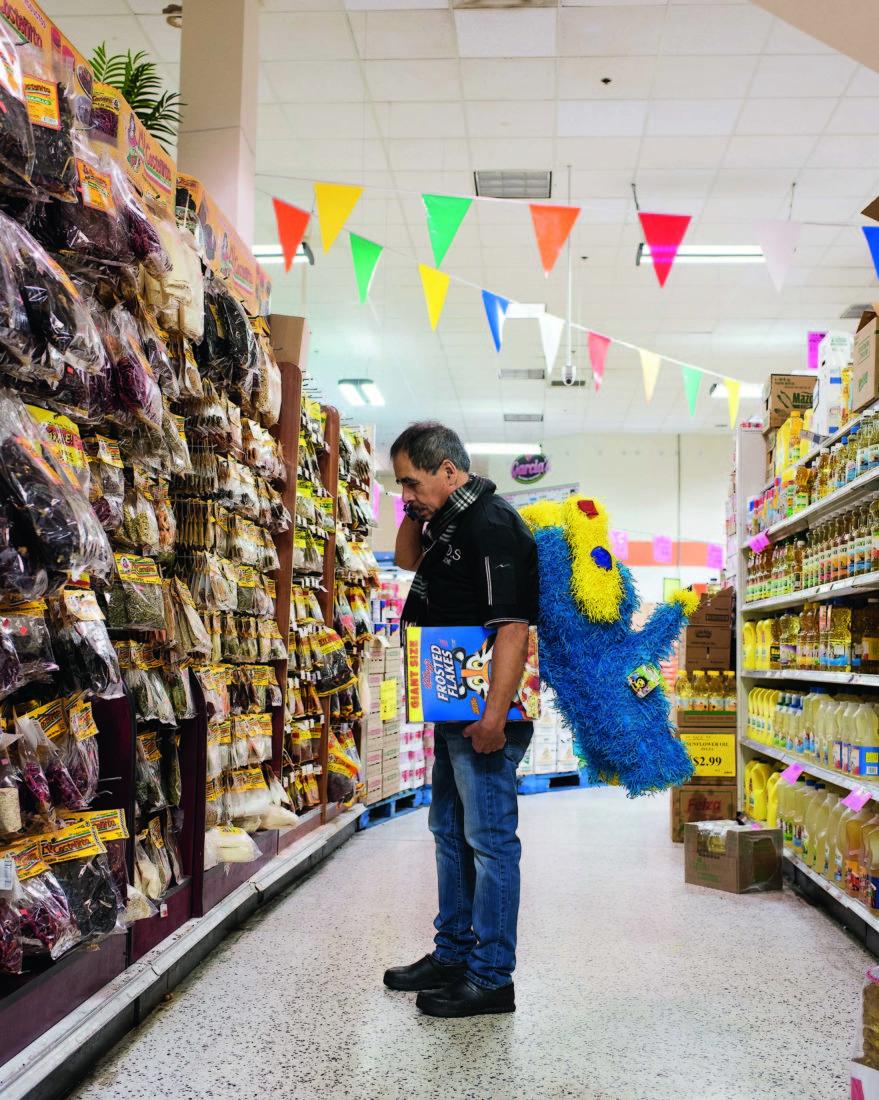
Photo: Bobby Fisher
Hernandez shopping at Mercado del Pueblo, his go-to Mexican market in Atlanta.
Hernandez still has a thick accent, but it’s impossible to miss his cursing. When he finds an appreciative audience, he turns the profanity up a notch, playing it for laughs and throwing in references to his Mexican American identity, the women in his life (who fall into two categories: exes and “future exes”), the cars he drives, his manhood. In reality, Hernandez’s life is much more modest: He lives in a one-bedroom apartment not far from the first Taqueria, on the Westside. His children are grown, and he now has a young grandson, and a girlfriend in Medellín, Colombia, whom he visits often. When he’s not working or traveling, he paints. Abstract works cram the walls of his home: Picasso meets Mose T human figures, sugarcane fields, a “Martian” he says is sad because it’s raining. He thinks his work will be “worth a lot of money” when he dies.
Not that he’s slowing down anytime soon. He and Klank quietly donate time and money to charities and nonprofits as varied as Hogs for the Cause, which benefits the families of children with brain cancer; the Ossabaw Island Foundation; and the Southern Foodways Alliance. For Taqueria del Sol, he spends most of his time creating new recipes, teaching his staff, and driving from restaurant to restaurant to monitor their efforts—tasting salsas, guacamoles, shrimp chowders, one by one.
Hernandez drops flour tortillas for the potpie into hot oil, and ladles the sizzling oil over the disks. Suddenly, they puff up. Once they are brown and crispy, he cracks them open to form a bowl. Next he’ll add the creamy chicken filling that’s simmering in a separate part of the kitchen.
Tasting the bubbling stew with a disposable plastic spoon, he remembers the time a health inspector hovered nearby. Hernandez was talking so much that he wasn’t paying attention. Without thinking, he put the spoon from his mouth back into the pot.
“She said, ‘I cannot believe you just did that!’”
Hernandez just laughed and shrugged. It wasn’t the first time he’d heard those words in the kitchen. And it wouldn’t be the last.


